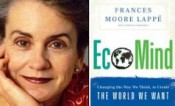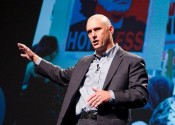NEW Free Forum CHUCK COLLINS Challenges 1% to Come Home – Born on Third Base
Written on December 1st, 2017CHUCK COLLINS is a senior scholar at the Institute for Policy Studies and author most recently of Born on Third Base: A One Percenter Makes the Case for Tackling Inequality, Bringing Wealth Home, and Committing to the Common Good. We talk about inequality in America and the GOP’s proposed 2017 tax bill that will only make things much worse.
https://www.ips-dc.org/ips-authors/chuck-collins/
DISRUPTIVE: BIO-INSPIRED ROBOTICS features three separate interviews with (1) RADHIKA NAGPAL, (2) ROBERT WOOD, and (3) CONOR WALSH
Written on October 15th, 2015Welcome to the second episode of my new monthly podcast series produced with Harvard’s Wyss Institute for Biologically Inspired Engineering.
DISRUPTIVE: BIO-INSPIRED ROBOTICS features three separate interviews with (1) RADHIKA NAGPAL, (2) ROBERT WOOD, and (3) CONOR WALSH. From insects in your backyard, to creatures in the sea, to what you see in the mirror, engineers and scientists at Wyss are drawing inspiration to design a whole new class of smart robotic devices
In this one, CONOR WALSH discusses how a wearable robotic exosuit or soft robotic glove can assist people with mobility impairments, as well as how the goal to create real-world applications drives his research approach.
In part one, RADHIKA NAGPAL talks about her work Inspired by social insects and multicellular systems, including the TERMES robots for collective construction of 3D structures, and the KILOBOT thousand-robot swarm. She also speaks candidly about the challenges faced by women in the engineering and computer science fields.
In part two, ROBERT WOOD discusses new manufacturing techniques that are enabling popup and soft robots. His team’s ROBO-BEE is the first insect-sized winged robot to demonstrate controlled flight.
The mission of the Wyss Institute is to: Transform healthcare, industry, and the environment by emulating the way nature builds, with a focus on technology development and its translation into products and therapies that will have an impact on the world in which we live. Their work is disruptive not only in terms of science but also in how they stretch the usual boundaries of academia.
http://wyss.harvard.edu/
– See more at:
DISRUPTIVE: BIO-INSPIRED ROBOTICS Radhika Nagpal Interview
DISRUPTIVE: BIO-INSPIRED ROBOTICS Robert Wood Interview
Conor Walsh’s interview transcript
http://aworldthatjustmightwork.com/2015/07/auto-draft-18/
Free Forum Q&A – SYSTEMS THINKING (1) FRITJOF CAPRA, author of several books including The Tao of Physics; The Turning Point & (2) NORA BATESON, director AN ECOLOGY OF MIND doc re: her late father, Gregory Bateson
Written on May 7th, 2015(1) FRITJOF CAPRA – Originally aired April 2009
(2) NORA BATESON – Originally aired July 2012
Both interviews this week explore systems thinking – one of the key ingredients of a world that just might work.
First. I speak with FRITJOF CAPRA, who wrote a book in 1981 that greatly influenced my view not only of science, medicine, agriculture, energy, and even politics – it influenced my view of reality. That book was THE TURNING POINT, and its message is as profound and revolutionary today. “We live today in a globally interconnected world, in which biological, psychological, social, and environmental phenomena are all interdependent. To describe this world appropriately we need an ecological perspective which the Cartesian world view does not offer. What we need, then, is a new ‘paradigm’ – a new vision of reality; a fundamental change in our thoughts, perceptions, and values.” Capra wrote those words in its preface.
In the second half my guest will be NORA BATESON, and we’ll talk about AN ECOLOGY OF MIND, the wonderful documentary she’s made about her father, the late anthropologist GREGORY BATESON. Her documentary is subtitled A Daughter’s Portrait of Gregory Bateson. It tells of the unique anthropologist, philosopher, author, naturalist, and systems theorist, who was ahead of his time in seeing reality as made up not of things or even of ideas, but of relationships. The film features interviews with California Governor Jerry Brown, physicist and systems theorist Fritjof Capra, Whole Earth Catalogue publisher Stewart Brand, cultural philosopher and poet William Irwin Thompson; and Nora’s sister, anthropologist Mary Catherine Bateson. Nora’s film will introduce Bateson to a new generation and remind many of us of the impact her father had on the way a lot of people perceived the world.
“The major problems in the world are the result of the difference between how nature works and the way people think.” Those are the words of the late Gregory Bateson – and I couldn’t agree more.
Q&A: Frances Moore Lappé, Author – ECOMIND: CHANGING THE WAY WE THINK, TO CREATE THE WORLD WE WANT
Written on October 2nd, 2014 |
Aired: 9/8/13
Originally Aired: 12/30/12
Where do you think the most important changes need to take place to turn things around in terms of big issues like the economy, the environment, and social justice?
Some might say climate change is the critical global issue so it must be clean energy. Others might say nothing will make as much difference for the world’s people as educating and empowering girls and women. Closer to home, a case can be made that public financing of political campaigns would have the most impact on all such issues by making it possible for the power of the United States to become a greater force for good.
All good answers, but this week’s guest gives another answer – and its one that I share. Frances Moore Lappe, who has herself been a force for good at least since the publication of the phenomenal best-seller Diet for a Small Planet in 1971, says that the greatest impact would follow from changing our minds.
In her 18th book, ECOMIND: CHANGING THE WAY WE THINK, TO CREATE THE WORLD WE WANT, Lappé argues that much of what is wrong with the world, from eroding soil to eroding democracies, results from ways of thinking that are out of sync with human nature and nature’s rhythms. Humans are doers, she says. But our capacity for doing is undermined by seven “thought traps” that leave us mired in fear, guilt, and despair — none of which are motivators to action.
Drawing on the latest research in climate studies, anthropology, and neuroscience, she weaves her analysis together with stories of real people the world over, who, having shifted some basic thought patterns, now shift the balance of power in our world. Chapter-by-chapter, Lappé takes us from “thought trap” to “thought leap,” and with each shift, challenges become opportunities.
Q&A: Mark Mykleby, Natl Security=Sustainability
Written on April 8th, 2013 |
Aired: 04/07/13
In the preface to an article entitled A National Strategic Narrative, Anne-Marie Slaughter of Princeton says we need a narrative that confronts some of the following questions, “Where is the United States going in the world? How can we get there? What are the guiding stars that will illuminate the path along the way? We need a story with a beginning, middle, and projected happy ending that will transcend our political divisions, orient us as a nation, and give us both a common direction and the confidence and commitment to get to our destination.” She also writes, “In one sentence, the strategic narrative of the United States in the 21st century is that we want to become the strongest competitor and most influential player in a deeply inter-connected global system, which requires that we invest less in defense and more in sustainable prosperity and the tools of effective global engagement.”
Over time, the best way to shape the force of the future is to invest in the science, technology, education, and training that will equip our soldiers, sailors, airmen, and marines to adapt to an increasingly complex and dynamic environment. The hardware and software we buy and build are secondary to the gray matter we must cultivate now.
When I hear that someone high up in the military is talking seriously about sustainability, I take notice.
www.newamerica.net


